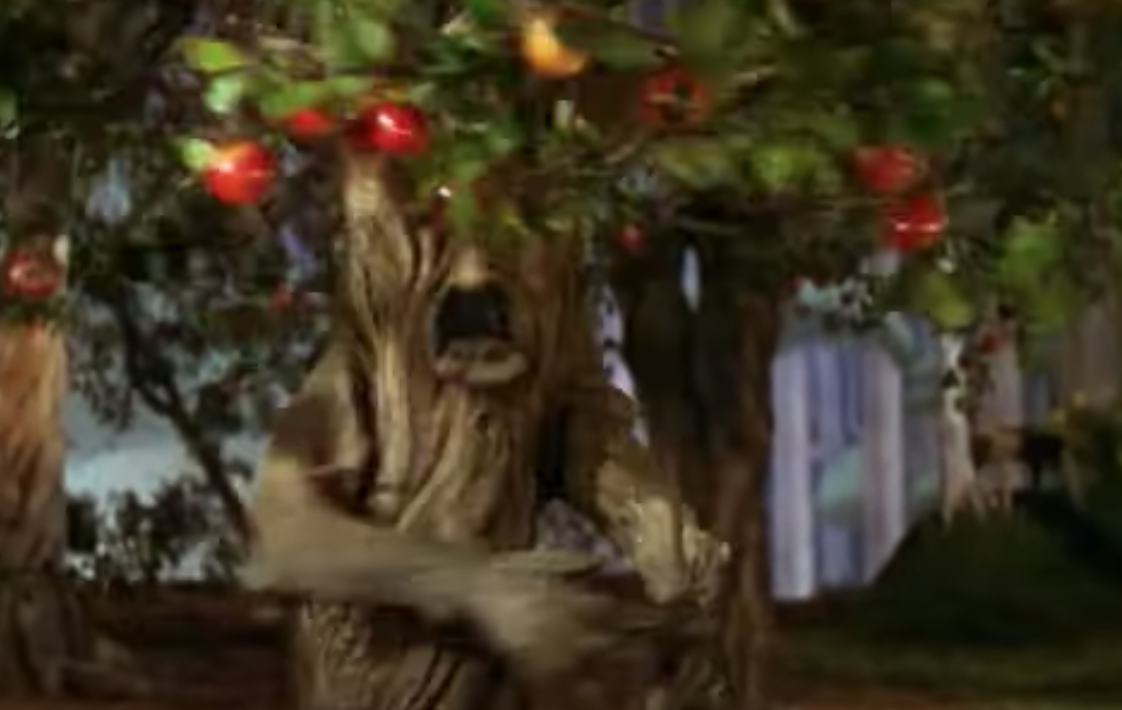View this post on Instagram
As children, most of us were introduced to “The Wizard of Oz.”
We accompanied Dorothy from Kansas, her dog, Toto, and her newly acquired friends of Scarecrow, Tin Man, and Cowardly Lion, all while pursuing the Wizard in this fantastical land called Oz.
Remember when as they’re all traveling down the yellow brick road they encounter a forest of trees? These trees were abundant in delicious, shiny red apples. And our beloved characters were hungry. Therefore, Dorothy went about some apple picking.
And here was where we learned we were “not in Kansas anymore.”
The trees were alive and not thrilled with being picked apart.
These trees fought back. They screamed, voiced their displeasure, and chewed out our heroine and her friends.
A case of reactive abuse, perhaps?
No one knows their anthropomorphic tree backstory. We don’t know how many other times, how many other clueless yokels, freshly fallen off from assorted turnip trucks, picked apples from their branches, thinking it was no big deal.
“The trees look like regular trees,” they reason.
Nothing new to see here.
How many of us can raise our branches and admit to struggling with reactive abuse?
How many of us have been repeatedly mistreated, abused, gaslit, and messed with to the point of exhaustion, mounting frustration, and full-blown rage? It can be experienced from one person or one specific relationship, or its final straw can happen at a seemingly random encounter with a stranger.
Regardless, we have hit a saturation point. Our apples have been picked one too many times now. We have had it!
Now I love Dorothy. I dressed up as her as a kid for Halloween. I love the other characters, “Toto, too!”
(Sorry, had to say it.)
I am all about these individuals finding their way through Oz, getting their answers and their dreams realized. But I also feel empathy for the “bad trees.”
As children, when we first watch the movie, we don’t see the trees’ perspective. We may see the scene as funny or scary. The trees seem “mean” to our childlike selves.
Now, however, as adults and as abuse/trauma survivors, perhaps we see the trees’ perspective. These trees had the trauma of reactive abuse.
When someone is disempowered to repeatedly “take it” time and time again, eventually, there is a snapping. The branch snaps. The mind snaps. The patience snaps. The “good nature” snaps.
The abused tree, that is you and I, is done!
“You’re not a tree. You can move.” I have heard this statement within the past few years. It speaks to the capacity for change—hopefully, healthy change.
It speaks to us going from disempowered to empowered, taking command of our lives.
Many of us get stuck arguing with this sentiment. Our tree selves, all too well-know from personal experience, have felt stuck, paralyzed, and trapped.
How exactly are we supposed to move, anyway?
The Rooted Lie
Our life experience has often been blue gingham abuser after blue gingham abuser. It’s easier to settle into the stuckness, accepting the limitations of being a tree instead of making forward movement.
“I have no choice but to endure this.”
We can get rooted into this state of being, feeling our apples dying on the branches. So many of us have been raised and taught that there is only one way to live and be in our lives. We don’t have choice. This is all there is. Generations and status quo of the same way of living spread now to us and determine our fate. Done deal.
It looks like there’s no room to move, doesn’t it?
The Moving Truth
But movement can start with one thought: challenge what is possible.
“I deserve healing. It will be a messy process, but I’m worth it.”
Reactive abuse can be a part of that mess.
We react, eventually, to the lying limitations that are trying to get forced upon us.
The people and the experiences—our home forests—attempt to dictate through abusive and limiting behaviors. They try to convince us that being poked at with the constant stifling of maltreatment and minimization is normal—and these experiences are the evidence that our lives are as they should be.
Don’t move. Just take it.
And we react. But it can be a sign of health and healing.
For here is where we at least begin to deal with some of the roots. They may not be uprooted right here, right now, but awareness can show us the things that strangle us.
It can all start when from our rooted vantage point, we look around at the rest of the landscape. We see there is more—at least in theory.
Even if we have not experienced it as such, we can move to challenge the thought and accept there is more for us.
So, we move to the awareness that healing needs to take place. And we are closer to healing because of that awareness.
The Rooted Lie
“I am trapped/stuck.”
We might believe that just because we have been in an abusive dynamic for a certain period of time that that situation is all we will ever experience.
And if we are being poked and picked at, within this oppressive context, yes, reaction will occur. The trapped creature will snarl and bite if it is cornered.
Feel cornered?
As we are in this state, we are not concentrating on what is at our disposal.
We cannot see our apples at the ready to come to our defense.
The Moving Truth
“I have an opportunity to heal here.”
Those apples? Some examples can be one different person in our status quo life, one book, and the concept of—at least at first—therapy as reality.
We move to being open to those kinds of options. And that movement is solidified.
Do one thing. We do one thing.
We acknowledge, reach for, grab a shiny apple, even in the middle of our reactive abuse. It moves us forward if we can hurl that apple of education, support, and new information at the abuse. We move as we recognize there is the reality of healing opportunity here.
It’s not just for the masses; it’s not just for “other people.”
It’s for us.
The Rooted Lie
“It’s hopeless/I’m a failure.”
Reactive abuse on our part can often occur when our response is not met with the satisfying validation we so crave and need.
Of course, our abusive situation is not interested in giving us any credence or credibility. Why would they? What would be in it for them?
Poking and picking at us is working for them. Why mess up a good thing?
We can get caught in a cycle of believing that the constant torture is the same thing as our perceived inherent failure status. After all, what is the evidence around us telling us otherwise? Where is it?
And that can be a recipe for a reaction—a sharp reaction.
Our sharp reaction to the pokes and the prodding, not surprisingly, can attempt to tell us that our reaction is a failed, wrong action on our part. We can get shamed for challenging the abuse. The issue is more about challenging the status quo that’s often filled with injustices. We do that, and we get punished for it.
How dare we use our apples to defend ourselves against our attackers?
The Moving Truth
“If it feels hopeless, yes, there’s failure built into this process, but I am not hopeless and a failure.”
We can, however, slowly and gradually embrace that our reaction—our reactive abuse to abuse—is not so much a failure, but rather, it can be a move, a healthy move. Perfection is not required, nor is it the guaranteed result of our movement. Being perfect, however, is often a must from our abusive sources. The pressure can be too daunting to even attempt. If we do not attempt, we do not move. We are easy to control as we try in vain to be perfect.
And control is a goal of those who practice abuse.
We can change how we view our supposedly immovable tree natures and the shiny red apples we possess. If we use our movements, our attempts, our failures, and our decisions to keep at it imperfectly over the course of our lives, no matter the issue or the era, we can change and empower ourselves. By moving, we choose that we are making ongoing progress, rather than writing ourselves off as hopeless failures.
Our reactions to the debilitating abuse we have suffered can be the lit fuse to a changed life.
And it takes a lifetime to do that.
No shortcut sprinting here. It’s the longer, daily marathon.
You and I are trees and we can move.
It can be an oversimplification and inaccurate to view ourselves as the angry trees throwing apples in “The Wizard of Oz.” Reactive abuse is a no-win situation. It’s constructed that way. How many of us were trying to live our lives and mind our business within a hostile relationship or environment?
We didn’t start any fight; we had no interest in engaging in a fight. We wanted peace, love, dignity, and a healthy sense of self. However, the situations we found ourselves in decided that no, that would not happen. It was “decided” by someone else that we would be in the defense position and that the status quo normal—according to the abusive individuals we were trying to survive.
Abuse is not a “one and done.” It is repetitive, daily, hourly, constant, with seemingly no end in sight.
Faced with that outlook, who amongst us would not react, right?
We are trees—strong, beautiful, examples of divine creation. And we have within us the capacity to react when pushed and prodded.
Before we berate ourselves, let’s pause and reflect:
Did my reaction occur because tension, pain, and chaos were building?
Was what was building in this unhealthy, harmful, and abusive situation?
How unrealistic is it for me to expect a perfect reaction from myself in an adverse situation?
How unlikely was it that the matter could have been resolved in a healthy and constructive manner?
Was this provoking behavior that produced my reaction ongoing?
Our anger and our reaction to abuse can, like the scene in “The Wizard of Oz,” produce evidence that yes, we are trees and we can move!
We can take action using the very thing that has been picked from us.
We are trees, and we can move!

~
Please consider Boosting our authors’ articles in their first week to help them win Elephant’s Ecosystem so they can get paid and write more.
 Share on bsky
Share on bsky





Read 0 comments and reply